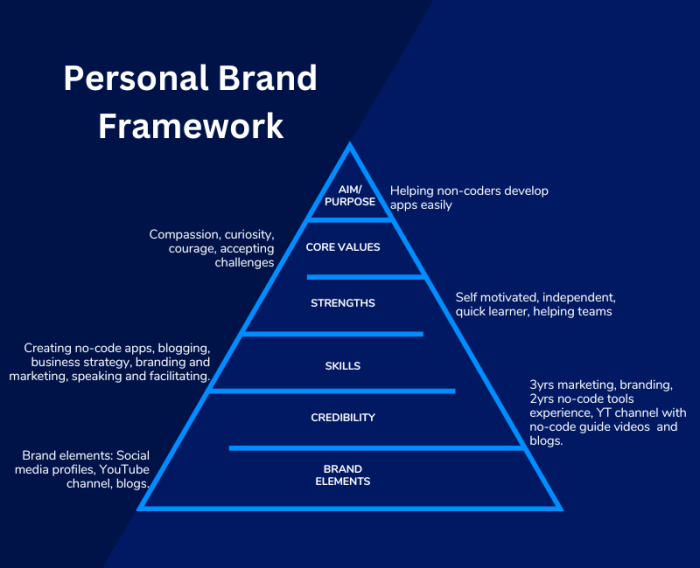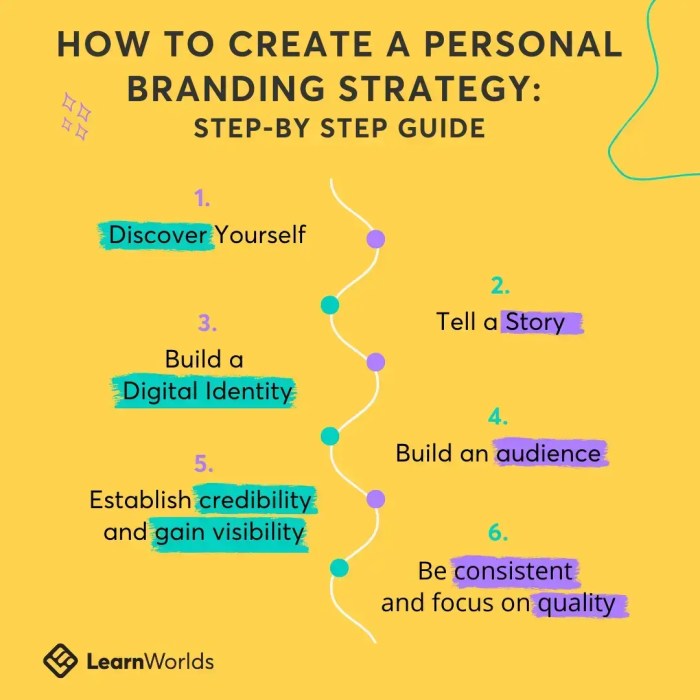Creating a Personal Branding Strategy kicks off with a bang, setting the stage for a journey into discovering and showcasing your authentic self. Get ready to dive deep into the world of personal branding and unlock your true potential.
As we delve further, we’ll explore key aspects like identifying your brand identity, crafting a compelling brand story, building an online presence, and mastering the art of networking to elevate your personal brand to new heights.
Introduction to Personal Branding Strategy: Creating A Personal Branding Strategy
Personal branding is the practice of marketing yourself and your career as a brand. It involves showcasing your unique skills, experiences, and personality to differentiate yourself from others in your field.
Having a personal branding strategy is crucial for personal and professional growth because it helps you stand out in a crowded marketplace, build credibility and trust with your audience, and create new opportunities for career advancement.
Examples of Successful Personal Branding Strategies
- 1. Gary Vaynerchuk: Known for his no-nonsense approach to entrepreneurship and social media marketing, Gary Vee has built a personal brand centered around hustle and authenticity.
- 2. Oprah Winfrey: Oprah’s personal brand is built on authenticity, empathy, and empowerment. She has successfully transitioned from a talk show host to a media mogul and philanthropist.
- 3. Elon Musk: Musk’s personal brand is synonymous with innovation and disruption. His bold vision for the future has made him a pioneer in industries like electric vehicles and space exploration.
Identifying Your Brand Identity

To create a strong personal branding strategy, it’s essential to first identify your brand identity. This involves recognizing your unique strengths, values, and skills that set you apart from others. By understanding what makes you special, you can effectively communicate your value to your target audience.
Defining Your Unique Strengths, Values, and Skills
To identify your unique strengths, values, and skills, take some time to reflect on what you excel at and what you are passionate about. Consider the feedback you have received from others, as well as your own self-assessment. Your strengths could include qualities like creativity, problem-solving abilities, or leadership skills. Your values are the principles and beliefs that guide your actions and decisions. Your skills are the specific abilities you have developed through education, training, and experience.
Importance of Defining Your Target Audience
Defining your target audience is crucial in personal branding because it helps you tailor your message and offerings to the people who are most likely to resonate with them. Consider factors like demographics, interests, and pain points when identifying your target audience. By understanding who you are trying to reach, you can create a more focused and effective branding strategy.
Differentiating Yourself in a Crowded Market
In a crowded market, it’s important to find ways to stand out and differentiate yourself from the competition. One way to do this is by showcasing your unique personality and story. Share your journey, experiences, and values with your audience to create a personal connection. Another strategy is to specialize in a niche or focus on a specific area where you excel. By becoming known for something specific, you can carve out a unique position for yourself in the market.
Creating a Brand Story
Crafting a compelling brand story is essential in personal branding as it helps to create a strong emotional connection with your audience. Your brand story is what sets you apart from others and allows people to relate to you on a deeper level. It humanizes your brand and makes it more memorable.
Significance of Storytelling in Personal Branding
Storytelling is a powerful tool in personal branding because it helps to communicate your values, beliefs, and personality in a way that resonates with your audience. By sharing your journey, struggles, and successes, you create an authentic connection with your followers. People remember stories more than facts or statistics, so a well-crafted brand story can leave a lasting impression.
Tips for Crafting a Compelling Brand Story
- Start with your why: Clearly define the purpose and values of your brand.
- Show vulnerability: Share personal experiences and challenges that have shaped you.
- Be authentic: Stay true to yourself and your brand identity.
- Create a narrative arc: Build suspense, conflict, and resolution in your story.
- Use visuals: Incorporate images and videos to enhance your storytelling.
Elements of a Memorable and Authentic Brand Story
- Emotion: Evoke feelings and connect with your audience on an emotional level.
- Consistency: Ensure your brand story aligns with your overall brand image and messaging.
- Audience-centric: Tailor your story to resonate with your target audience’s needs and desires.
- Uniqueness: Highlight what makes you different and stand out from the crowd.
- Call-to-action: Inspire your audience to take action or engage with your brand after hearing your story.
Building an Online Presence

Building an online presence is crucial in today’s digital world for personal branding. Social media plays a significant role in shaping how others perceive you and your brand, making it essential to utilize these platforms effectively.
Role of Social Media in Personal Branding, Creating a Personal Branding Strategy
Social media platforms like Instagram, LinkedIn, Twitter, and Facebook provide a direct way to connect with your audience and showcase your brand personality. By sharing content that reflects your values, expertise, and interests, you can build credibility and trust with your followers.
- Engage with your audience: Respond to comments, messages, and feedback to create a two-way conversation.
- Consistent posting: Regularly share content that aligns with your brand identity to maintain visibility and engagement.
- Visual storytelling: Use images, videos, and graphics to convey your brand message effectively.
Maintaining an active presence on social media can help you stay top of mind with your audience and attract new opportunities.
Creating a Consistent and Engaging Online Presence
Consistency is key when building an online presence. Ensure that your branding elements, such as your profile picture, bio, and content style, are uniform across all platforms. Here are some strategies to create a cohesive and engaging online presence:
- Define your brand voice: Establish a tone and style that resonates with your target audience.
- Content planning: Develop a content calendar to maintain a consistent posting schedule and plan ahead for relevant topics.
- Interact with your audience: Encourage discussions, ask questions, and respond to comments to foster engagement.
Maintaining a Professional Image Across Online Platforms
It’s essential to present a professional image on all online platforms to build credibility and trust with your audience. Consistency in branding, messaging, and interactions can help you establish a strong online presence. Here are some tips to maintain a professional image:
- Use a professional profile picture and bio that accurately represent your brand.
- Avoid controversial topics or posts that may be detrimental to your personal brand.
- Monitor your online presence regularly and address any negative feedback or comments promptly.
Networking and Building Relationships
Networking and building relationships play a crucial role in personal branding, as they help in expanding your reach, creating opportunities, and establishing credibility in your field.
Effective Networking Tips
- Attend industry events and conferences to meet like-minded professionals.
- Utilize social media platforms like LinkedIn to connect with industry leaders and potential collaborators.
- Join professional networking groups or organizations related to your field.
- Follow up with contacts regularly to maintain relationships and stay top of mind.
Value of Building Strong Relationships
Building strong relationships is key to growing your personal brand as it fosters trust, loyalty, and support from your network. These relationships can lead to referrals, collaborations, and new opportunities that can elevate your brand to the next level.
